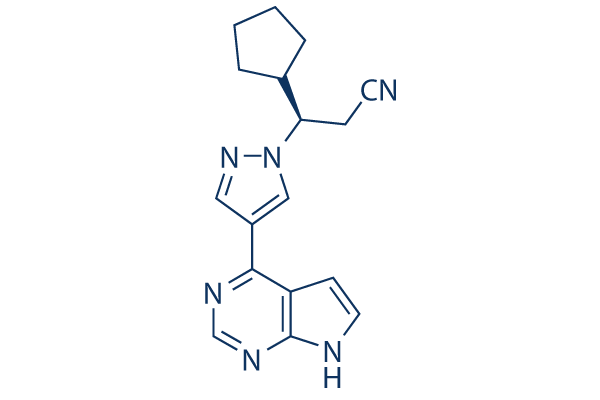Ruxolitinib

Jakafi (ruxolitinib) is a kinase inhibitor used in the treatment of intermediate or high-risk types of myelofibrosis, a potentially life-threatening blood cancer. The starting dose of Jakafi is 20 mg given orally twice daily for patients with a platelet count greater than 200 X 109/L, and 15 mg twice daily for patients with a platelet count between 100 X 109/L and 200 X 109/L. Jakafi is available in the following forms and strengths: 5, 10, 15, 20, and 25 mg tablets.
Ruxolitinib, a kinase inhibitor, inhibits Janus Associated Kinases (JAKs) JAK1 and JAK2 which mediate the signaling of a number of cytokines and growth factors that are important for hematopoiesis and immune function. JAK signaling involves recruitment of STATs (signal transducers and activators of transcription) to cytokine receptors, activation and subsequent localization of STATs to the nucleus leading to modulation of gene expression. Myelofibrosis (MF) and polycythemia vera (PV) are myeloproliferative neoplasms (MPN) known to be associated with dysregulated JAK1 and JAK2 signaling. In a mouse model of JAK2V617F-positive MPN, oral administration of ruxolitinib prevented splenomegaly, preferentially decreased JAK2V617F mutant cells in the spleen and decreased circulating inflammatory cytokines (eg, TNF-α, IL-6).
The following side effects are common (occurring in greater than 30%) for patients taking Jakafi: anemia and thrombocytopenia.
These side effects are less common side effects (occurring in about 10-29%) of patients receiving Jakafi: increased liver enzymes, diarrhea, bruising, swelling, neutropenia, dizziness, increased cholesterol, shortness of breath, nasopharyngitis, headache, constipation, nausea, vomiting, and insomnia.
